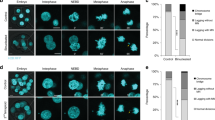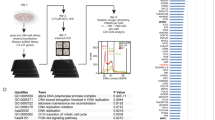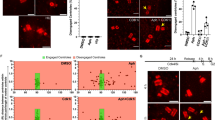Abstract
Erroneously arising tetraploid mammalian cells are chromosomally instable and may facilitate cell transformation. An increasing body of evidence shows that the propagation of mammalian tetraploid cells is limited by a p53-dependent arrest. The trigger of this arrest has not been identified so far. Here we show by live cell imaging of tetraploid cells generated by an induced cytokinesis failure that most tetraploids arrest and die in a p53-dependent manner after the first tetraploid mitosis. Furthermore, we found that the main trigger is a mitotic defect, in particular, chromosome missegregation during bipolar mitosis or spindle multipolarity. Both a transient multipolar spindle followed by efficient clustering in anaphase as well as a multipolar spindle followed by multipolar mitosis inhibited subsequent proliferation to a similar degree. We found that the tetraploid cells did not accumulate double-strand breaks that could cause the cell cycle arrest after tetraploid mitosis. In contrast, tetraploid cells showed increased levels of oxidative DNA damage coinciding with the p53 activation. To further elucidate the pathways involved in the proliferation control of tetraploid cells, we knocked down specific kinases that had been previously linked to the cell cycle arrest and p53 phosphorylation. Our results suggest that the checkpoint kinase ATM phosphorylates p53 in tetraploid cells after abnormal mitosis and thus contributes to proliferation control of human aberrantly arising tetraploids.






Similar content being viewed by others
References
Andreassen PR, Martineau SPN, Margolis RL (1996) Chemical induction of mitotic checkpoint override in mammalian cells results in aneuploidy following a transient tetraploid state. Mutat Res Fundam Mol Mech Mutagen 372:181–194
Andreassen PR, Lohez OD, Lacroix FB, Margolis RL (2001) Tetraploid state induces p53-dependent arrest of nontransformed mammalian cells in G1. Mol Biol Cell 12:1315–1328
Blagosklonny MV (2006) Prolonged mitosis versus tetraploid checkpoint: how p53 measures the duration of mitosis. Cell Cycle 5:971–975
Borel F, Lohez OD, Lacroix FB, Margolis RL (2002) Multiple centrosomes arise from tetraploidy checkpoint failure and mitotic centrosome clusters in p53 and RB pocket protein-compromised cells. Proc Natl Acad Sci U S A 99:9819–9824
Bulavin DV, Saito S, Hollander MC, Sakaguchi K, Anderson CW, Appella E, Fornace AJ (1999) Phosphorylation of human p53 by p38 kinase coordinates N-terminal phosphorylation and apoptosis in response to UV radiation. EMBO J 18:6845–6854
Carpenter AE, Jones TR, Lamprecht MR, Clarke C, Kang IH, Friman O, Guertin DA, Chang JH, Lindquist RA, Moffat J, Golland P, Sabatini DM (2006) Cell Profiler: image analysis software for identifying and quantifying cell phenotypes. Genome Biol 7:R100
Castedo M, Coquelle A, Vivet S, Vitale I, Kauffmann A, Dessen P, Pequignot MO, Casares N, Valent A, Mouhamad S, Schmitt E, Modjtahedi N, Vainchenker W, Zitvogel L, Lazar V, Garrido C, Kroemer G (2006) Apoptosis regulation in tetraploid cancer cells. EMBO J 25:2584–2595
Comai L (2005) The advantages and disadvantages of being polyploid. Nat Rev Genet 6:836–846
Crasta K, Ganem NJ, Dagher R, Lantermann AB, Ivanova EV, Pan Y, Nezi L, Protopopov A, Chowdhury D, Pellman D (2012) DNA breaks and chromosome pulverization from errors in mitosis. Nature 482:53–58
Dalton WB, Yu B, Yang VW (2010) p53 suppresses structural chromosome instability after mitotic arrest in human cells. Oncogene 29:1929–1940
Fujiwara T, Bandi M, Nitta M, Ivanova EV, Bronson RT, Pellman D (2005) Cytokinesis failure generating tetraploids promotes tumorigenesis in p53-null cells. Nature 437:1043–1047
Galipeau PC, Li X, Blount PL, Maley CC, Sanchez CA, Odze RD, Ayub K, Rabinovitch PS, Vaughan TL, Reid BJ (2007) NSAIDs Modulate CDKN2A, TP53 and DNA content risk for progression to esophageal adenocarcinoma. PLoS Med 4:e67
Ganem NJ, Pellman D (2007) Limiting the proliferation of polyploid cells. Cell 131:437–440
Ganem NJ, Godinho SA, Pellman D (2009) A mechanism linking extra centrosomes to chromosomal instability. Nature 460:278–282
Gehen SC, Staversky RJ, Bambara RA, Keng PC, O’Reilly MA (2008) hSMG-1 and ATM sequentially and independently regulate the G1 checkpoint during oxidative stress. Oncogene 27:4065–4074
Guerrero AA, Gamero MC, Trachana V, Futterer A, Pacios-Bras C, Diaz-Concha NP, Cigudosa JC, Martinez-A C, van Wely KHM (2010) Centromere-localized breaks indicate the generation of DNA damage by the mitotic spindle. Proc Natl Acad Sci U S A 107:4159–4164
Guidotti J-E, Bregerie O, Robert A, Debey P, Brechot C, Desdouets C (2003) Liver cell polyploidization: a pivotal role for binuclear hepatocytes. J Biol Chem 278:19095–19101
Guo Z, Kozlov S, Lavin MF, Person MD, Paull TT (2010) ATM activation by oxidative stress. Science 330:517–521
Hassold T, Hall H, Hunt P (2007) The origin of human aneuploidy: where we have been, where we are going. Hum Mol Genet 16:R203–R208
Janssen A, van der Burg M, Szuhai K, Kops GJ, Medema RH (2011) Chromosome segregation errors as a cause of DNA damage and structural chromosome aberrations. Science 333:1895–1898
Krastev DB, Slabicki M, Paszkowski-Rogacz M, Hubner NC, Junqueira M, Shevchenko A, Mann M, Neugebauer KM, Buchholz F (2011) A systematic RNAi synthetic interaction screen reveals a link between p53 and snoRNP assembly. Nat Cell Biol 13:809–818
Krzywicka-Racka A, Sluder G (2011) Repeated cleavage failure does not establish centrosome amplification in untransformed human cells. J Cell Biol 194:199–207
Kwon M, Godinho SA, Chandhok NS, Ganem NJ, Azioune A, Thery M, Pellman D (2008) Mechanisms to suppress multipolar divisions in cancer cells with extra centrosomes. Genes Dev 22:2189–2203
Ladenstein R, Ambros IM, Potschger U, Amann G, Urban C, Fink FM, Schmitt K, Jones R, Slociak M, Schilling F, Ritter J, Berthold F, Gadner H, Ambros PF (2001) Prognostic significance of DNA di-tetraploidy in neuroblastoma. Med Pediatr Oncol 36:83–92
Lanni JS, Jacks T (1998) Characterization of the p53-dependent postmitotic checkpoint following spindle disruption. Mol Cell Biol 18:1055–1064
Li M, Fang X, Baker DJ, Guo L, Gao X, Wei Z, Han S, van Deursen JM, Zhang P (2010) The ATM-p53 pathway suppresses aneuploidy-induced tumorigenesis. Proc Natl Acad Sci U S A 107:14188–14193
Mayer VW, Aguilera A (1990) High levels of chromosome instability in polyploids of Saccharomyces cerevisiae. Mutat Res 231:177–186
Meraldi P, Honda R, Nigg EA (2002) Aurora-A overexpression reveals tetraploidization as a major route to centrosome amplification in p53-/- cells. EMBO J 21:483–492
Mikule K, Delaval B, Kaldis P, Jurcyzk A, Hergert P, Doxsey S (2007) Loss of centrosome integrity induces p38-p53-p21-dependent G1-S arrest. Nat Cell Biol 9:160–170
Olaharski AJ, Sotelo R, Solorza-Luna G, Gonsebatt ME, Guzman P, Mohar A, Eastmond DA (2006) Tetraploidy and chromosomal instability are early events during cervical carcinogenesis. Carcinogenesis 27:337–343
Oromendia AB, Dodgson SE, Amon A (2012) Aneuploidy causes proteotoxic stress in yeast. Genes Dev 26:2696–2708
Shackney SE, Smith CA, Miller BW, Burholt DR, Murtha K, Giles HR, Ketterer DM, Pollice AA (1989) Model for the genetic evolution of human solid tumors. Cancer Res 49:3344–3354
Shi Q, King RW (2005) Chromosome nondisjunction yields tetraploid rather than aneuploid cells in human cell lines. Nature 437:1038–1042. doi:10.1371/journal.pone.0006564, 2009 Aug 10;4(8):e6564
Silkworth WT, Nardi IK, Scholl LM, Cimini D (2009) Multipolar spindle pole coalescence is a major source of kinetochore mis-attachment and chromosome mis-segregation in cancer cells. PLoS One 10:e6564
Stingele S, Stoehr G, Peplowska K, Cox J, Mann M, Storchova Z (2012) Global analysis of genome, transcriptome and proteome reveals the response to aneuploidy in human cells. Mol Syst Biol 8:608
Stolz A, Ertych N, Kienitz A, Vogel C, Schneider V, Fritz B, Jacob R, Dittmar G, Weichert W, Petersen I, Bastians H (2010) The CHK2-BRCA1 tumour suppressor pathway ensures chromosomal stability in human somatic cells. Nat Cell Biol 12:492–499
Storchova Z, Kuffer C (2008) The consequences of tetraploidy and aneuploidy. J Cell Sci 121:3859–3866
Storchova Z, Breneman A, Cande J, Dunn J, Burbank K, O’Toole E, Pellman D (2006) Genome-wide genetic analysis of polyploidy in yeast. Nature 443:541–547
Thompson SL, Compton DA (2010) Proliferation of aneuploid human cells is limited by a p53-dependent mechanism. J Cell Biol 188:369–381
Torres EM, Williams BR, Tang YC, Amon A (2010) Thoughts on aneuploidy. Cold Spring Harb Symp Quant Biol 75:445–451
Uetake Y, Sluder G (2004) Cell cycle progression after cleavage failure: mammalian somatic cells do not possess a “tetraploidy checkpoint”. J Cell Biol 165:609–615
Uetake Y, Sluder G (2011) Prolonged prometaphase blocks daughter cell proliferation despite normal completion of mitosis. Curr Biol 20:1666–1671
Vitale I, Galluzzi L, Vivet S, Nanty L, Dessen P, Senovilla L, Olaussen KA, Lazar V, Prudhomme M, Golsteyn RM, Castedo M, Kroemer G (2007) Inhibition of Chk1 kills tetraploid tumor cells through a p53-dependent pathway. PLoS One 2:e1337
Vitale I, Jemaa M, Senovilla L, Galluzzi L, Rello-Varona S, Meivier D, Ripoche H, Lazar V, Dessen P, Castedo M, Kroemer G (2010a) Involvement of p38a in the mitotic progression of p53 -/- tetraploid cells. Cell Cycle 9:2823–2829
Vitale I, Senovilla L, Jemaa M, Michaud M, Galluzzi L, Kepp O, Nanty L, Criollo A, Rello-Varona S, Manic G, Metivier D, Vivet S, Tajeddine N, Joza N, Valent A, Castedo M, Kroemer G (2010b) Multipolar mitosis of tetraploid cells: inhibition by p53 and dependency on Mos. EMBO J 29:1272–1284
Wong C, Stearns T (2005) Mammalian cells lack checkpoints for tetraploidy, aberrant centrosome number, and cytokinesis failure. BMC Cell Biol 6:6
Yang Z, Loncarek J, Khodjakov A, Rieder CL (2008) Extra centrosomes and/or chromosomes prolong mitosis in human cells. Nat Cell Biol 10:748–751
Acknowledgments
We are thankful to Steven Taylor for providing the RPE1 cells stably transfected with H2B–GFP. We thank Tom Gaitanos, Steven Bergink, and Sabine Elowe for their helpful comments on the manuscript. We are thankful to Aline Sewo Pires de Campos, Susanne Gutmann, Daniela Fellner, and Miriam Penka for technical support.
Author information
Authors and Affiliations
Corresponding author
Additional information
Communicated by Erich Nigg
Rights and permissions
About this article
Cite this article
Kuffer, C., Kuznetsova, A.Y. & Storchová, Z. Abnormal mitosis triggers p53-dependent cell cycle arrest in human tetraploid cells. Chromosoma 122, 305–318 (2013). https://doi.org/10.1007/s00412-013-0414-0
Received:
Revised:
Accepted:
Published:
Issue Date:
DOI: https://doi.org/10.1007/s00412-013-0414-0




